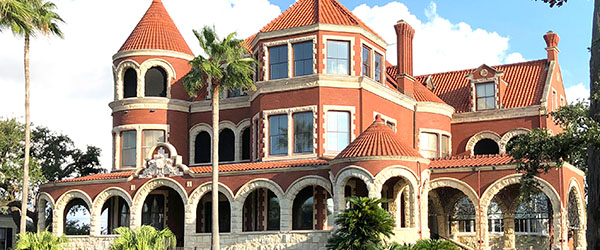Fall Migration Has Begun!
Despite the fact it still feels like summer here, the birds know it’s fall and migration has already begun! It’s a great time to go birding, as both the variety of species and numbers of birds are increasing on a daily basis.

| Red-tailed Hawk Immature on Galveston Island | Kristine Rivers |
Raptors are on the move, and Red-tailed Hawks and Ospreys are leading the push into our area. Check for them on power lines and fence posts, favorite perches for both species as they hunt for prey. It takes four years for raptors to molt into adult plumage, and Red-tails can be especially tricky to identify with highly variable markings in different individuals. One consistent field mark that can be relied upon is the light V-shaped pattern of chevron markings on the back, which is visible in all plumage variations.

| Lesser Black-Backed Gull on Galveston Island | Kristine Rivers |
On the beaches, Semi-palmated Plovers and Western Sandpipers can be seen in small flocks, and many more species of gulls and terns are beginning to appear. Scan the mixed flocks carefully for Lesser Black-backed Gulls, which are quite similar to the more common Herring Gulls. Like raptors, gulls molt into adult plumage over four years’ time, and with all ages present simultaneously it can be confusing. However, Herring Gulls always have pink legs, and that is a great differentiator. Although Lesser Black-backed are only slightly smaller, their legs are yellow.
Eco-Art Kayak Adventure
Take a Self-guided Tour

| Blue-Winged Teal on Galveston Island | Kristine Rivers |
Blue-winged Teal are usually the first waterfowl to appear in the fall and the last to leave in the spring, and this year is no exception – the first few teal have arrived on the Island. They are surface feeders, so look for them in shallow ponds such as those along Stewart Road on the West End, and in the estuaries and lagoons on the East End. The male of this species is easily identified by its small size and white crescent-shaped mark on the head.

| Vermilion Flycatcher on Galveston Island | Kristine Rivers |
While spring may be the best time to see warblers and flycatchers, they also pass back through our area in the fall. With a visit to Galveston Island State Park, you can see gorgeous red Vermilion Flycatchers and the bright yellow flashes of Couch’s Kingbirds in flight. It’s also not unusual to see both Eastern and Western Kingbirds at the same time at Lafitte’s Cove this time of year. Pay careful attention to the tail when trying to distinguish between Couch’s and Western Kingbirds – Western has white outer tail feathers which are often displayed as they fly from perch to perch.

| Long-billed Curlews on Galveston Island | Kristine Rivers |
Finally, scan the golf courses on the Island for Long-billed Curlews and Marbled Godwits probing deep into the ground for insects and other invertebrates. Although these species share warm brown, highly patterned plumages, their long bills are quite different – the curlew’s bill curves downward, while the godwit’s is upturned instead.
If you’re not sure where to visit, you can find our self-guided Birding Itineraries on the Galveston Island Nature Tourism Council site and in the Galveston Visitors Center. You really can’t go wrong!
#BirdGalveston
Bring the Whole Family
Eco-Art Kayak Adventure
Kristine Rivers
Kristine Rivers founded Birding for Fun in 2015, and is a popular tour guide and speaker whose enthusiasm for nature is contagious. A lifelong birder, she has been an area leader for the Brazoria Columbia Bottomlands Christmas Bird Count since 2011, and has been President of the Texas Master Naturalist Cradle of Texas chapter since January 2017.







